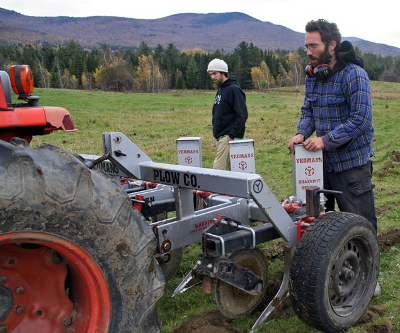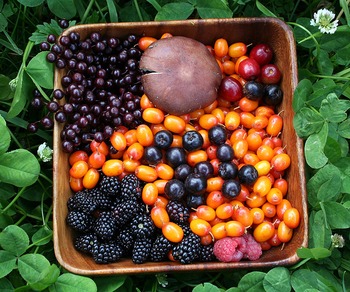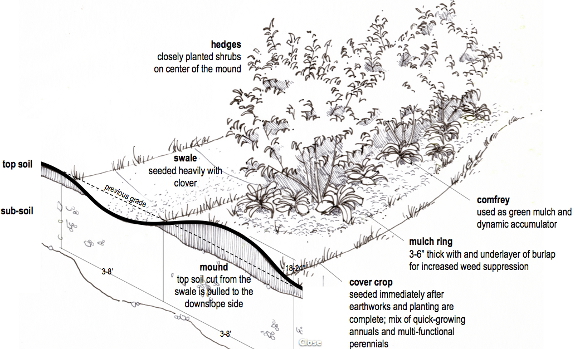
Using leverage points to improve a farm fast
 Ben
Falk is very adamant about peak oil and climate change, but he makes a
good argument for using heavy equipment for certain purposes while we
have fuel available. He wrote:
Ben
Falk is very adamant about peak oil and climate change, but he makes a
good argument for using heavy equipment for certain purposes while we
have fuel available. He wrote:
Mark tends to drag me
along kicking and screaming into a similar world of permaculture
realism, so I was interested to see what Falk considers worth spending
fossil fuels on. He focuses on five "leverage points" --- ways to
quickly improve your farm using the minimum amount of time and energy
--- and several of these strategies require heavy equipment on his
ten-acre scale:
- Clearing trees. Like us, Falk has found that it's tough to start with a forest as the base of your farm. He's very willing to pull out the chainsaw when it comes to clearing trees.
- Swales and fertigation. Rather than fighting waterlogged soil, Falk chose to create ponds and rice paddies that catch water during heavy storms, then ditches that can channel that water slightly uphill during droughts. Ducks in smaller ponds infuse the water with nitrogen, and that rich water is used to fertilize the rice paddies. Meanwhile, in drier parts of the farm, on-contour swales capture rain to hydrate trees planted upon the double-dose of topsoil along the downhill sides of the trenches. Elsewhere, island mounds (like what I use in the forest garden) raise plants out of waterlogged soil. All of these earthworks are easily created with Falk's favorite tool --- the excavator.
- Tilling and scraping to produce bare soil. Heavy equipment comes in handy here too, to create the disturbance required to give seeds and new plants a spot to grow. (On the smaller scale, I advocate kill mulches for this, but on a multi-acre scale, I'm not sure there's a fast alternative to tilling.)
- Broadcasting seeds and putting in perennials.
Now we're out of the stages that require lots of heavy machinery and
into the biological realm, which I always feel is pretty
self-explanatory. A couple of interesting points from Falk's book
include using a stropharia root dip for newly-planted trees, which allowed him to inoculate his
 orchard
mulch for two-year yields of mushrooms, and intercropping buckwheat
between large vegetables (squash and tomatoes), then pulling out the
cover crop as the vegetables need space. I'll write more about
Falk's plant systems in a later post.
orchard
mulch for two-year yields of mushrooms, and intercropping buckwheat
between large vegetables (squash and tomatoes), then pulling out the
cover crop as the vegetables need space. I'll write more about
Falk's plant systems in a later post. - Grazing animals, especially ruminants and chickens.
As I'm sure you've heard elsewhere, animals round out ecosystems and
help close the fertility loop. Falk felt that goats and pigs
didn't fit his farm, that sheep were useful but should eventually be
phased out since they tend to need medications (perhaps to be replaced by cows), that broilers are handy, and that ducks are the perfect livestock for his farm.
If this post isn't already incendiary enough, I'll end with a Falk's stance on another energy source --- cold hard cash:
What do you think of
using the current wealth of gasoline and money to fuel the beginning
stages of permaculture systems? Is it a worthwhile expenditure if
the maintenance stages can be performed with little cash and with hand
tools?
| This post is part of our The Resilient Farm and Homestead lunchtime series.
Read all of the entries: |
Want more in-depth information? Browse through our books.
Or explore more posts by date or by subject.
About us: Anna Hess and Mark Hamilton spent over a decade living self-sufficiently in the mountains of Virginia before moving north to start over from scratch in the foothills of Ohio. They've experimented with permaculture, no-till gardening, trailersteading, home-based microbusinesses and much more, writing about their adventures in both blogs and books.
Want to be notified when new comments are posted on this page? Click on the RSS button after you add a comment to subscribe to the comment feed, or simply check the box beside "email replies to me" while writing your comment.


Anna, I'm a little cash and hand tools kinda girl but I can start to get anxiety prone when I think about how long it might be before I'm where ideally I'd like to be. Time and resources may not be on our side much longer.
I've done some homework on Mr. Falk and find him to be a very sincere and devoted environmentalist with a clear vision of what is important. Thank you for bringing him to our attention.
I agree with both Falk and the comment by Lee. If the oil and money have to go anywhere, I think this is the correct type of application. I see it as a carbon investment of sorts--the carbon he burns as fossil fuel during his initial operations will likely be exceeded within a few years (maybe decades) by the carbon he stores in his soil. If he runs the equipment on biodiesel or alcohol or whatever, the payback is that much quicker. If he did it by hand, he wouldn't incur much carbon debt, but his farm's carbon-storage capacity would take a lot longer to get going full throttle, if it ever reaches the same level he'll be able to achieve using the heavy machinery initially.
It's too bad that internal combustion-powered equipment needs so much maintenance! If all it needed was fuel, he might be able to use it indefinitely!
I agree with Ben. In master planning our homestead, we have a lot of earth works to do, and I believe that either renting or borrowing some heavy equipment will be the most efficient way to do the terracing and water works. We had considered purchasing the equipment ourselves, but once the big jobs are done, we wouldn't have much use for a bulldozer or front-end loader, so we will rent them for a month? and get it all done, then do maintenance and further refinements with manual labor and hand tools.
Karen B.
a) I have a problem with self sanctimonious, hyprocritical Treehuggers who profess care for the environment, but then chop down trees to turn forest biome into artificial grassland biome. Loss of habitat is the biggest problem facing the natural World. (Not that he shouldn't have the right to do what he wants. Just get off the High Horse.)
b) While "peak oil" is a legitimate, mathematical concept, it's probably a little farther off then we now suspect. Be that as it may, we have recently discovered enough natural gas to last us 6 or more centuries, and it's a really easy conversion to go from liquid petro fuels to NG.
c) Animals don't really "fertilize their fields.' If they didn't eat the forage, it would drop and rot in its place anyways. The animals' manure (or decomposing veg) actually out-gases N2 back into the air, decreasing fertility over-all. One can use manure to move nutrients, so to speak, from one field to another, decreasing the fertility of the donor field in dong so.
I must have taken a double dose of crumudgeon pills this AM. Sorry for the rant
Great stuff!
I recently came across a video of Mark Shepard, author of "Restoration Agriculture". His STUN technique is right up my alley: Sheer, Total, Utter Neglect
We tried rotational, mob grazing on our open pasture this year. It wasn't sufficient to make it through our dry, hot summer. So now we're going to try our hands at silvopasture and alley cropping. Like Shepard and Falk, I have no objections to use fossil fuel to dig the swales etc. Shepard also shows how you can use the alley crops to produce your own biofuel (in theory I guess, our pasture is probably to small at 5 acres).
I haven't read the book, but I'll comment on another reason to use heavy equipment to develop a homestead. What if you're old and feeble, like me? You may have neither the strength nor the time to develop the property using hand tools.
I'm 65. Last year we bought 44 acres in the North Country of northern NY. This is old farmland, grown over to trees, brambles, and meadows. 30 acres of it is a federal conservation easement, so all we can do is mow the meadows after the game birds have finished their chick raising. But the remainder is a daunting task. There are literally scores of old apple trees scattered around the property, still producing lots of small apples, but badly overgrown with brambles and trash trees. The old stone fences have mature trees growing up through them. There are lots of wildcrafting flora-- we put up a lot of chokecherry jelly this year.
Still, the first thing I'm doing in the spring is buying an old tractor and a bush hog. I can't see any other way to develop the property to a fully productive state, given the amount of time I have left.
I know this is a bit late to the discussion, but hopefully will be helpful to others like me who are reading this post (years) later.
One of the leverage points is "Tilling and scraping to produce bare soil", with the comment being kill mulches on a multi-acre scale are not efficient (essentially). That would be a lot of resources and possibly time and definitely effort!
But consider using the natural instincts of animals to work for you instead. Certainly not as fast as mechanical tilling, but over all pretty fast and with a lot of additional outputs for you! You can get more helpful info by looking up Geoff Lawton. He has one great video that shows succession from undesirable land to food forest. [Check out "reforesting with goats", "chicken tractor on steroids", and https://www.youtube.com/watch?v=6wI9Arel9tQ excellent! "food forest with chickens: 0-10 years tour"] Others have also elaborated on this idea.
The most important element in this idea is careful management and design so you get all the benefits and don't over-stress the land or yourself.
As an example- if you are starting with woodland area, use goats to clear brush and undesirable trees (protect trees you want to keep!). Mob graze them and move as soon as they clear what you don't want. Other outputs are- fertilizing the area, meat (easiest), hides, horns, [if breeding stock] baby goats, milk, entertainment. You are going to want to design for no additional feed, minimal shelter and fencing (like multipurpose, portable electric net), if you want to keep the animals over the winter or not. Goats will clear land quite fast.
Then follow up with poultry (or use for nonwoody areas, like where you want to go from yard to garden plot). Chickens or turkeys are common. A lot of people use chicken tractors or electro-net fencing. Why would I till when my chickens WANT to till for me? They will scratch up a piece of land pretty quickly, too. Plus are eating weed seeds and pest insects. Can a tiller do that? We all know the potential delicious outputs of meat and eggs; they also add fertilizer to the soil. Plus following them after the goats allows further break-up of pest cycles.
You may need to do several rotating cycles like that. Other animals may work best for different situations.
Then you would broadcast a cover crop and start planting to perennials (especially trees) if you are doing a food forest, or start building swales (I am all for the machinery on that one if you are doing a big area), or start planning your garden beds. Any large trees that need removing can be used for firewood, swale and hugelkulture building, mushroom logs. . .
I would say for a major land change this could take a year. Start in spring and clear it through summer ready to cover crop and plant perennials in fall. Annuals in spring. Or if just for garden, cover crop with something that reliably winter-kills and leave that for a mulch, planting your annuals through. Would be great to pass chickens through one more time before planting to loosen soil and pick off any weed seeds or insect eggs.
Or for chickens, is easy to overwinter cycling through the areas, apply some mulch material, plant up in spring with heavy feeders. I've had squash do very well in a similar situation (transplants with a bit of straw mulch).